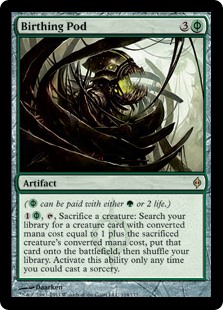There’s been a slew of action in the competitive Magic world lately. Busy, busy, busy. I threw my sleep patterns into disarray to watch the limited portions of the Pro Tour live from Spain, tending to fall asleep in the first or second constructed round before suffering through a day of sleep deprivation. Good times, though. The quality of the competition rewarded my sleep sacrifice.
My biggest Magic strategy revelation was seeing how Steve Rubin’s GW tokens deck could use [casthaven]Hangarback Walker[/casthaven] to flip [casthaven]Archangel Avacyn[/casthaven] on command, allowing a go-wide tokens strategy to seamlessly morph into wrath-plus-finisher mode. Many decks can play sweepers, but few can push others to play sweepers and still have their own in reserve. I expect GW to be the dominant deck of this Standard season because of this cross-archetype power. It is the new faeries, which isn’t too surprising given that [casthaven]Archangel Avacyn[/casthaven] is [casthaven]Serra Angel[/casthaven] with flash and upside.
All of that was sadly overshadowed, however, by Wizards of the Coast Organized Play announcements curtailing support for platinum pros. I heard it live, half asleep at 4am or whenever Helene Bergeot delivered it, and all I could think was, “oh, now it begins.” You never expect to hear someone died, but you know people are going to die. The news is often not so much a surprise as a disappointment. And that’s how I felt when I heard the platinum news.
I think often about the future of professional Magic. What does it look like two, five, ten years down the road? How deeply do I want to be involved in it? We discuss this on the super secret Hispters email list, and it’s something I assume a lot of people have mulled over. If they haven’t yet, they will now. I believe we have reached an inflection point in the Magic Pro Tour. [casthaven]Reality shift[/casthaven]s, and then we notice it, hopefully without too much delay. The Organized Play announcement was merely a public acknowledgment—or declaration or warning, take your pick—that the ground under professional Magic has moved.

The Pro Tour has come of age (early twenties, go figure) and the parents in Renton are dropping hints that it’s time to move out. That’s not a good thing or a bad thing—it’s just reality. Wizards, as good loving parents, are struggling to convey the news. Surely this happens to you: afraid to tell someone some bad news, you delay while searching for the right words. Before you speak up, the window closes—it becomes too late to say anything with tact.
Wizards created the Pro Tour to develop Magic as a legitimate intellectual pursuit. Magic is a deep, brilliant game—it needs a professional circuit. The creators of the game had to get it started. But now the Pro Tour is a real thing. People plan their lives around it. The institution has grown and matured. Its needs do not align with its parents’ needs anymore. They both point in the same general direction, but require nuanced emphasis in the details. Those nuances have started to diverge.
The Pro Tour needs fundraising. Find people who will put large sums of money up front to fund prize pools and platinum stipends, with the expectation of reaping rewards through growth, presumably through advertising but maybe also talent recruiting. This must happen, in some form. Wizards does not have the resources or the proper motivations to find these funds. The money can’t just get pulled out of profits from selling cards. That money has to go to revolutionizing Magic Online, which is something Wizards can control and aligns with the company’s purpose. Let someone else, some independent entity, channel brilliant minds into funding the Pro Tour. They will do a better job, and make more money doing it, assuming they are successful.
If the Pro Tour cannot exist independent of Wizards of the Coast, it will die. Wizards has known this for a while. Look at the changes to Grand Prix scheduling and coverage, or the increased planeswalker point multipliers given to StarCity Games and other independent tournament circuits. Wizards really wants some enterprising people to swoop in and take over the Organized Play infrastructure, from planning to funding to broadcast. Wizards has done this for so long because it did not look remotely viable for anyone else to do it. The Pro Tour, and its supporting Grand Prix circuit, needed parental support. Now, they need to not need parental support.
If Magic survives as an eternal game, with generations of casual and competitive play, this must happen. Wizards can keep making new cards and delivering a great product as long as people will buy it, but they cannot also manage the Pro Tour. Pulling the plug on funding the Pro Tour will happen eventually, whether the individuals running Wizards (or Hasbro or Giant ComglomCo or whatever) want that or not. Corporations exist precisely to make the difficult decisions we avoid as individuals. Their ability to do so, soullessly and with a patina of efficiency, is why corporations have endured and grown to dominate our society. Unless an entity exists whose primary purpose is to promote and grow the Pro Tour—by definition someone other than Wizards—the Pro Tour will end up in the deleted cells of a spreadsheet and a footnote on a private equity earnings report.
So, what now?
Let’s make it.
Carrie O’Hara is Editor-in-Chief of Hipsters of the Coast.


